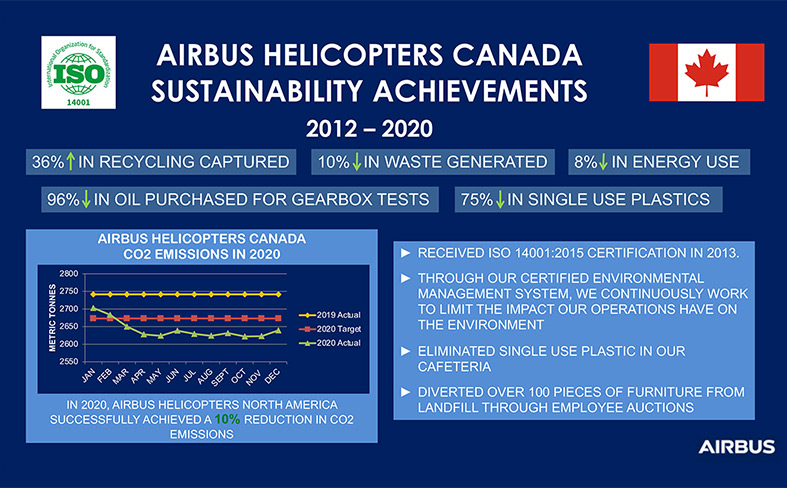That’s why Airbus Helicopters is taking a long-term approach to environmental protection — from cutting CO2 emissions to eliminating single-use plastics in local facilities.
“It’s more than simply a company goal. A detailed sustainability strategy drives how we do business, design our products and services and plan for the future,” said Tom Caldwell, who oversees sustainability programs for Airbus Helicopters Inc. “We’re making significant progress toward sustainability, focusing on the future and what we can do to protect the planet.”
Globally, Airbus has pledged to reduce CO2 emissions by 30% by 2025, and Airbus Helicopters Inc. in the U.S. and Airbus Helicopters Canada are doing their part to help achieve that target.
Here is a look at how Airbus Helicopters North America is building a better planet:
- Both Airbus Helicopters Inc. and Airbus Helicopters Canada follow rigorous environmental standards established by the International Organization for Standardization.
- In 2020, Airbus Helicopters Canada eliminated single-use plastics from its cafeteria, reducing waste by roughly 75%. Airbus Helicopters Inc. plans to eliminate all-single use plastics at its Grand Prairie and Columbus facilities by the end of 2021.
- Airbus Helicopters Inc. has cut its water usage by nearly 70% in the past decade by adopting a web-based irrigation system, landscaping with drought-resistant plants and reusing water for outdoor irrigation.
- Airbus Helicopters Canada began recycling and reusing oil from gearbox tests in 2015. Previously, that oil was disposed as hazardous waste after one use. A recycling unit now filters impurities from the oil, enabling its reuse multiple times. Canada has cut its oil purchases by 96%, which also reduced packaging waste and saved thousands of dollars.
- Airbus Helicopters Inc. recycles and reuses fuel used for aircraft testing. Oil that was previously used once is now filtered and reused multiple times.
- In 2016, Airbus Helicopters Inc.’s headquarters in Grand Prairie, Texas began diverting waste from a landfill to a facility that converts waste into fuel. In 2020, AHI achieved a major milestone — zero waste to landfill. The company is looking to achieve the same target at its production center in Columbus, Mississippi
- Both sites are working closely with suppliers to reduce packaging waste and partner with companies that are making advances in sustainability.
- Airbus Helicopters Inc. plans to begin testing sustainable aviation fuels by the end of this year, which has the potential to dramatically cut CO2 emissions.
- Reducing reliance on electric energy is critical, and both Airbus Helicopters Canada and Airbus Helicopters Inc. are working with suppliers to launch wind and solar energy programs.
Environmentally friendly practices are not only good for the planet, but livelihood itself depends on change. In 2019, Airbus identified climate change as the top potential risk to disrupt business.
“We are committed to being a strong community ally by preserving what we have for future generations,” said Stephanie Unsworth, environmental health and safety coordinator for Airbus Helicopters Canada. “Our employees are actively engaged in finding ways to reduce our environmental footprint in their day-to-day work because they know how important it is. This is not a one-person job.”





